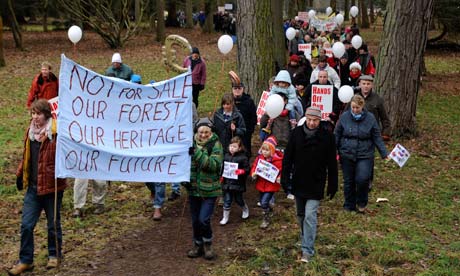If we lose our forests, our culture will suffer. Our next big march should be in the name of our national woodlands

A protest this week at the Forest of Dean, Gloucestershire, one of the woods under threat. Photograph: Adrian Sherratt
'The enemies of wood," Roger Deakin wrote in Wildwood, "are always the enemies of humanity." I've been thinking of Deakin a lot since news surfaced of the coalition's plan to sell all of the Forestry Commission's English land. What would Deakin, that planter of pips, that weaver of ash, have made of this grand arboreal auction? And I've been thinking, too, of something WH Auden once wrote: "A culture is no better than its woods."
The UK is already one of the least wooded countries in Europe. If the government's proposals come to fruition, we could soon have to live with even less: they will sell our national woodland to developers, or power companies or charities or perhaps simply the highest bidder. We will not be able to guarantee the survival of the forests we lose, nor can we be assured that we will retain public access to this woodland. And if we lose our woods, then our culture will suffer, perhaps irreparably.
So if anyone at Protest HQ is drawing up a schedule, I'd like to suggest that our next big march should be about the forests. This week saw a demonstration at the Forest of Dean, one of the woodland areas under threat, and drew a crowd of 3,000. But I want more. I want a march on the scale of the student protests, thousands of us thronging down Whitehall in the name of our national woodlands. Instead of placards we can take saplings; we'll plant them en route in a spot of guerilla forestry.
The coalition was elected on a promise to be our greenest-ever government. And if you listen to Caroline Spelman, secretary of state for environment, food and rural affairs, the Forestry Commission sale is not at odds with this promise; it is not, she argued in this newspaper, so much an idea for a fast buck, or a feckless shirking of responsibility, but a devolving of power, a more localised approach to government, a chance for "individuals, businesses, charities and local authorities . . . [to play] a much bigger role in protecting their natural environment". "Public," she argued, "is not always good."
I disagree. The sign of a civilised society, a civilised culture, is precisely what it makes public, be it education, information, health, care for the needy, us to our nation, the individual to the whole; it makes us care and feel cared for.
If these responsibilities are left solely to organisations other than the state, problems will surely arise. Feasibly a charity such as the Woodland Trust, or the Campaign to Protect Rural England, or the Wildwood Trust or similar body could attempt to buy the Forestry Commission land, but this would require funds – both to purchase and to maintain them. It is a sad truth that charities are rarely so able to summon the cash that big businesses can.
The scale is unimaginable
A couple of years ago, I visited the Woodland Trust's Heartwood Forest in Hertfordshire. The project is an attempt to create England's largest new continuous native forest – when completed it will cover 858 acres. alongside ancient woodland, 600,000 native trees will be planted with oak, dogwood, ash, maidenhair, hornbeam and walnut. It is an attempt to redress the fragmentation of our ancient woodland; the greatest threat to British wildlife is the fragmentation of its habitat. There will be a community orchard, wildflower meadows, footpaths and bridleways. It will cost £8.5m. Today, their task has never seemed more vital, or more Sisyphean.
The Forestry Commission sale would encompass 20% of all of England's wooded land – 650,000 acres in total, including 20,000 hectares of ancient woodland. The scale of it is preposterous, unimaginable. But it is not the enormity of it we should be looking at, not the numbers or the acreage – rather, it is the specifics, the places, the people, the species under threat: the woods where you walk your dog, or where you take your children to see the bluebells in spring; the streams where you played in your youth, the trees you climbed, the dens you made. It is the foresters who work in these woods. It is the hornbeam, the field mouse, the foxglove, the pearl-bordered fritillary, one of the many butterflies under threat. It is the call of the nightingale, and the cuckoo, the hawfinch, tree pipit and the lark. It is the smell of wet earth and leaf mould, it is the sound of the mistle thrush, the sun-dappled ferns, the scent of wild garlic. It is what has lain at the heart of English culture for centuries.
In his introduction to Wildwood, Deakin also wrote of a desire to excite "a feeling for the importance of trees through a greater understanding of them, so that people don't think of 'trees' as they do now, but of each individual tree and each kind of tree". It is such an approach we need now more than ever – for our forests and our students and our sick and poor, we need to excite a similar kind of understanding of individuality, an understanding that promotes compassion. After all, if a single tree falls in the forest, I believe we have a responsibility to make sure that it is heard.



